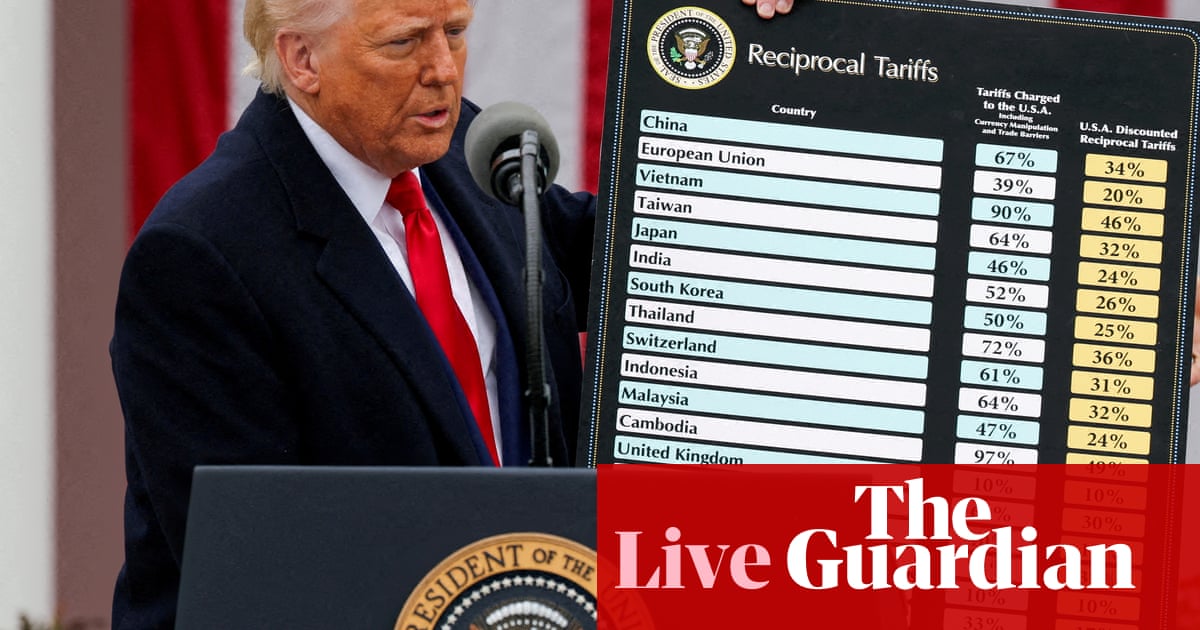Good morning and welcome to our live coverage of US politics and the secondTrump administration.
The main news this morning is that aManhattan-based court has blocked the president’s sweeping tariffs on global importsfrom coming into effect - a huge blow to an integral pillar of his plan for economic growth.
The US court of international tradesaid yesterday that Trump lacked the authority to use the emergency economic powers legislation that he cited when heunveiled additional taxes on foreign-made goodson what he called “liberation day” last month.
Tariffs usually require the approval of Congress - but the US president argued he had power to act because it was a “national emergency”.
The Trump White House filed an appeal against the judgment minutes after it was handed down.
“President Trump pledged to put America first, and the administration is committed to using every lever of executive power to address this crisis and restore American greatness,” Trump’s spokespersonKush Desaisaid.
Trump’s powerful deputy chief of staff,Stephen Miller, reacted to the federal court ruling byposting on Xthat “the judicial coup is out of control”.
We will have more reaction to the ruling from court of international trade in New York and other US politics stories throughout the day so stick with us.
The White House has 10 days to complete the process of trying to halt the tariffs, which were imposed to reverse the US’s massive and longstanding trade deficits, although most of these levies are currently suspended anyway.
Any legal challenge to the ruling will have to be heard at the US court of appeals for the federal circuit in Washington DC, and ultimately the US supreme court.
Over the last few months, Trump has introduced a confusing and evolving slate oftariffsagainst specific countries – such as China - and industries that the president says are negatively impacting America’s trade.
Many of his harshest tariffs have been paused, however, and some exemptions have been made as countries around the world have launched charm offensives to try to curry favour with the US president.
Financial markets, on the whole, have cheered the ruling. The US dollar rallied following the court’s order, surging against currencies such as the euro, yen and the Swiss franc in particular. Wall Street futures rose and equities across Asia also rose.
The UK’sFTSE100 blue chip index has ticked up 0.1%, while the German Dax rallied 0.9%. France’s CAC 40 has risen 1%. Trump’s “liberation day” tariffs, in contrast, shook global financial markets and caused massive uncertainty.
You can read the latest market reaction inour business live blog.
Here is what the three-judge panel at the New York-based court of international trade said when it blockedDonald Trumpfrom imposing sweeping global tariffs on imports.
“The Worldwide and Retaliatory Tariff Orders exceed any authority granted to the President by IEEPA to regulate importation by means of tariffs,” the court wrote, referring to the 1977 International Emergency Economic Powers Act that Trump cited to justify the tariffs.
“The court does not pass upon the wisdom or likely effectiveness of the president’s use of tariffs as leverage. That use is impermissible not because it is unwise or ineffective, but because (federal law) does not allow it,” the panel said in the decision.
The court also blocked a different set of levies the Trump administration imposed onChina,MexicoandCanada, for what the White House said was in response to the unacceptable flow of immigrants and synthetic opioids across the US border.
Good morning and welcome to our live coverage of US politics and the secondTrump administration.
The main news this morning is that aManhattan-based court has blocked the president’s sweeping tariffs on global importsfrom coming into effect - a huge blow to an integral pillar of his plan for economic growth.
The US court of international tradesaid yesterday that Trump lacked the authority to use the emergency economic powers legislation that he cited when heunveiled additional taxes on foreign-made goodson what he called “liberation day” last month.
Tariffs usually require the approval of Congress - but the US president argued he had power to act because it was a “national emergency”.
The Trump White House filed an appeal against the judgment minutes after it was handed down.
“President Trump pledged to put America first, and the administration is committed to using every lever of executive power to address this crisis and restore American greatness,” Trump’s spokespersonKush Desaisaid.
Trump’s powerful deputy chief of staff,Stephen Miller, reacted to the federal court ruling byposting on Xthat “the judicial coup is out of control”.
We will have more reaction to the ruling from court of international trade in New York and other US politics stories throughout the day so stick with us.
